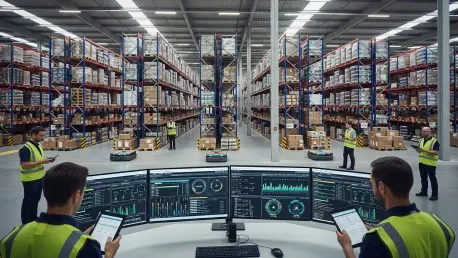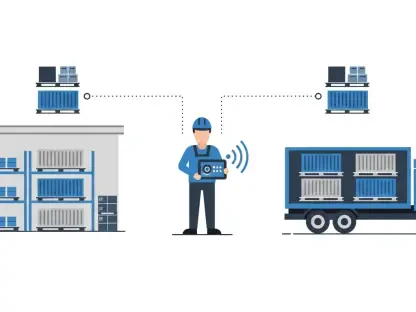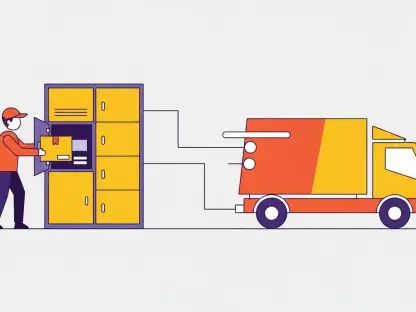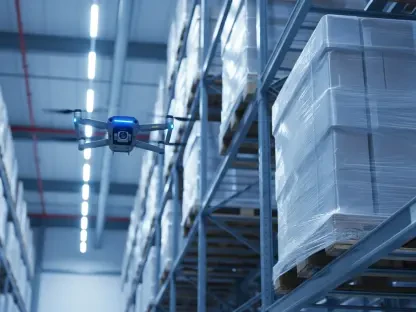Transforming logistics in the digital age is a complex endeavor, yet it is one that KiK Textilien und Non-Food GmbH is navigating with precision and innovative flair. By integrating a cutting-edge warehouse management system (WMS) across its operations, KiK is not merely keeping pace with technological advancements but redefining the dynamics of retail distribution. This move addresses the urgent need for agility and accuracy in supply chain operations amidst rapid consumer demands and shifting market trends. KiK’s strategic shift towards advanced technologies in logistics underscores the vital role that efficient supply chain management plays in retail success. In today’s global marketplace, where consumer expectations are higher than ever before, logistics and warehouse management have emerged as pivotal elements that dictate the speed and efficiency of deliveries. With a sophisticated WMS, retailers like KiK can optimize their supply chain processes, ensuring that products reach the end consumers smoothly and on time, boosting overall customer satisfaction and profitability.
Discover the driving force behind KiK’s logistical revolution: How is technology rewriting the rules of retail distribution?
Incorporating technology into logistics transforms traditional procedures into streamlined operations, with seamless WMS integration playing a crucial role in this transition. At its core, this technological integration signifies a strategic shift not just for KiK but also for the retail industry, as it navigates the complex demands of modern consumers. Implementing such advanced systems allows retailers to maintain a tight grip on inventories, manage warehouse space more efficiently, and ensure that operations align with overarching business objectives.
The Crucial Role of Logistics in Retail Success
Understanding the complexities behind retail logistics means unpacking a multifaceted network where inventory levels, shipment times, and delivery routes each serve as separate yet interconnected cogs of an elaborate machine. As retailers look to expand and diversify, the ability to manage these components efficiently becomes paramount. Warehouse management systems (WMS) emerge as a vital solution, providing the infrastructure needed to tackle these challenges head-on and streamline operations seamlessly. Effective WMS does more than organize products; it offers a holistic approach to inventory management, enabling companies like KiK to adapt to market changes swiftly and confidently. By ensuring real-time tracking and improved inventory accuracy, WMS contributes to the successful execution of the overall retail strategy, emphasizing the value of a robust logistics framework in attaining market leadership.
Pioneering Integration Across Borders
Cross-border integration of advanced logistics systems presents unique challenges, which KiK effectively overcame through the successful implementation of its WMS in Poland and Slovakia. This multinational approach not only demonstrates KiK’s commitment to expanding its logistical capabilities but also underscores the benefits of international collaboration in addressing the complexities of global supply chains. Delivering excellence through innovation becomes a defining attribute as KiK harnesses technology to streamline operations across borders. Through collaborative international projects, the benefits become manifold. Enhanced inventory traceability, steadfast adherence to FIFO principles, and more adaptive product management strategies are just some achievements facilitated by KiK’s WMS. Such innovations underscore KiK’s pursuit of excellence by utilizing technology to transform its logistical operations.
Leveraging Digital Strategy for Process Harmonization
The integration between KiK’s enterprise resource planning (ERP) and WMS serves as a blueprint for achieving harmonized processes across the board. Through standardized interfaces, KiK has crafted a unified IT structure that simplifies scalability and enhances overall efficiency—an essential component of future-proofing its operations in an ever-changing retail landscape. This approach not only aligns with the company’s digital strategy but also promotes a more cohesive operational framework, reducing the potential for disruptions during expansion. By eschewing rigid protocols and embracing flexible, standardized solutions, KiK ensures seamless integration and collaboration between different departments and locations, paving the way for successful and sustained growth.
Insights from the Experts
The ability to integrate a robust WMS across international locations is no small feat, as echoed in the collaborative efforts involving Alain Linder, Team Lead Project Management Consulting at Ehrhardt Partner Group (EPG), whose expertise was invaluable to the project’s success. His insight on structured implementation underscores how collaboration across diverse teams laid the groundwork for this technological transformation. The central logistics team, in coordination with local staff, SAP specialists, and EPG experts, reflects a shared vision that was instrumental in the flawless execution of this ambitious strategy. Their collective input and dedication highlight the vital importance of clear communication and mutual understanding in achieving long-term objectives.
Practical Steps Toward Digital Transformation
Effective digital transformation hinges on comprehensive training and systematic knowledge transfer, and KiK’s approach exemplifies this truth. Lessons gleaned from its Polish operation informed the strategies applied when integrating the WMS in Slovakia, ensuring smooth transitions and minimizing disruptions. Staff training focused on upskilling the workforce and enhancing competencies vital to the new digital landscape. Taking a significant step toward a greener, more efficient future, KiK transitioned to paperless processes at their Kostolné Kračany distribution center. The adoption of digital delivery notes is just the beginning, with plans to expand the WMS applications to include high-bay warehouse technology and advanced conveyor systems, further showcasing KiK’s commitment to innovation.
In conclusion, KiK’s transformative journey through seamless WMS integration demonstrated a groundbreaking shift in logistics and supply chain management. By aligning strategic technology deployment with robust training and international collaboration, KiK laid the foundation for ongoing innovation and competitive advantage in the retail sector. This forward-thinking approach facilitated the achievement of scalable solutions, offering lessons on leveraging technology for efficient operations and sustainable growth.









